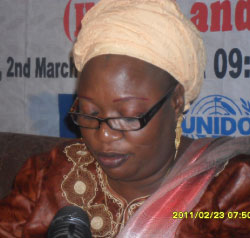
Stakeholders on Wednesday attended a one-day validation workshop on value chain analysis of the dairy and poultry industries in The Gambia.
The workshop, held at the Baobab Holiday Resort, was aimed at creating an enabling environment for employment in order to develop a skilled, versatile, dynamic and efficient workforce, thereby creating opportunities for wage and self-employment in both the formal and informal economy.
In delivering her opening statement, Naffie Barry, Permanent Secretary at the Ministry of Trade, Regional Integration and Employment, said poverty literature indicates that one of the underlying causes of poverty in The Gambia is the relatively high unemployment and underemployment rates, particularly among women and the youth.
This, she notes, is because of limited job opportunities, while the majority of the Gambian population are mainly engaged in agriculture for their survival.
Although reliable data on employment are not readily available, PS Barry admitted that employment rate is high in the country.
Unemployment figures are however pegged at 6 per cent, she said, adding: “Unemployment problem is more glaring when we look at the National Youth Policy (2009-2018) that defines youth as being within the age bracket of 15-30 and that 67 per cent of the Gambian population are less than 25 years old.”
The Trade PS noted that women constitute 51 per cent of the total population with an estimated 70 per cent of them get engaged in low productivity rural subsistence agriculture.
Therefore, in terms of household livelihoods and living standards, agriculture is critically important and justifies the need for an in-depth review of the sector and related policies to assess potential economic and social impact as well as environmental performance.
According to Mrs Barry, Gamjobs did commission some time ago a value chain study, whose objective is to assess the current situation of the dairy subsector and the poultry industry in a bid to identify constraints and opportunities for growth and development of the subsector and the industry with a view to promoting investment and employment opportunities, particularly for women and the youth.
In her closing remarks, Madam Halimatou Touray, coordinator of Gamjobs, said the validation workshop on Value Chain Analysis of the Dairy and Poultry Industries in The Gambia was characterised by fruitful and insightful exchanges that took place in a spirit of brotherhood.
She said: “In accordance with our mandate to create the favourable environment for employment opportunities and develop the capacities of young men and women, Gamjobs commissioned a Value Chain Study in order to assess the current situation of the dairy subsector and the poultry industry in a bid to identify constraints and opportunities for growth and development of the subsector and the industry with a view to promoting investment and employment opportunities, particularly for women and youth, and bring about a positive change in our national development.
“In the course of the workshop, we were given an overview of the Poultry and Dairy Value Chains, we looked at the prevailing conditions and we examined challenges and constraints that operators encounter in their activities with particular reference to gaps in the supply chain and in the area of support services as well as the need to increase capacity building of farmers and extension workers to support farmers. Also, we looked at health and funding issues and incentives for actors in the value chain.”
The reports have put forward recommendations and priority actions to be carried out by government, operators and other partners, she also noted, saying that the recommendations as well as the new ones that have emerged from the validation exercise would guide Gamjobs with relevant decision-makers in responding to current needs along both value chains.
She as well reaffirmed government’s commitment in working with the private sector, and all operators along the poultry and dairy value chain to take the sector to higher heights, support entrepreneurship and skills training in these sectors and create employment.
Madam Touray reaffirmed their support and commitment to pushing the cause of the dairy and poultry sector to achieve better levels of employment for women and youth.
“We need to form networks for advocacy purposes and to protect the interest of the producers and the consumers of poultry, milk and other dairy products,” she said. “I would therefore urge that these networks are formed as soon as possible.”
She applauded the consultants, Mr Mamadi Ceesay, Dr Touray and Mr Omar Njai for a job well done and for their invaluable support in the run-up to the validation exercise.
She also thanked the participants for their attendance and contributions to further enrich the reports.


